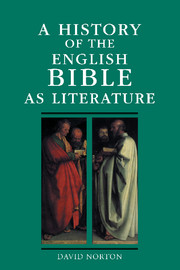Book contents
- Frontmatter
- Contents
- List of plates
- Preface
- List of abbreviations
- 1 Creators of English
- 2 From the Great Bible to the Rheims-Douai Bible: arguments about language
- 3 The King James Bible
- 4 Literary implications of Bible presentation
- 5 The struggle for acceptance
- 6 The Psalter in verse and poetry
- 7 ‘The eloquentest books in the world’
- 8 Writers and the Bible 1: Milton and Bunyan
- 9 The early eighteenth century and the King James Bible
- 10 Mid-century
- 11 The critical rise of the King James Bible
- 12 Writers and the Bible 2: the Romantics
- 13 Literary discussion to mid-Victorian times
- 14 The Revised Version
- 15 ‘The Bible as literature’
- 16 The later reputation of the King James Bible
- 17 The New English Bible
- Bibliography
- General Index
- Biblical Index
8 - Writers and the Bible 1: Milton and Bunyan
Published online by Cambridge University Press: 05 June 2012
- Frontmatter
- Contents
- List of plates
- Preface
- List of abbreviations
- 1 Creators of English
- 2 From the Great Bible to the Rheims-Douai Bible: arguments about language
- 3 The King James Bible
- 4 Literary implications of Bible presentation
- 5 The struggle for acceptance
- 6 The Psalter in verse and poetry
- 7 ‘The eloquentest books in the world’
- 8 Writers and the Bible 1: Milton and Bunyan
- 9 The early eighteenth century and the King James Bible
- 10 Mid-century
- 11 The critical rise of the King James Bible
- 12 Writers and the Bible 2: the Romantics
- 13 Literary discussion to mid-Victorian times
- 14 The Revised Version
- 15 ‘The Bible as literature’
- 16 The later reputation of the King James Bible
- 17 The New English Bible
- Bibliography
- General Index
- Biblical Index
Summary
‘THE BEST MATERIALS IN THE WORLD FOR POESY’
Passages proclaiming the literary superiority of the Scriptures to all literature were given a new turn by the poet Abraham Cowley (1618–67) in his ‘Preface to poems’ (1656). He describes the current situation of poetry as one in which with grief and indignation he sees ‘that divine science employing all her inexhaustible riches of wit and eloquence either in the wicked and beggarly flattery of great persons, or the unmanly idolising of foolish women, or the wretched affectation of scurril laughter, or at best on the confused antiquated dreams of senseless fables and metamorphoses’ (p. 12). Reform of poetry's subject matter rather than of the art itself is needed:
Amongst all holy and consecrated things which the devil ever stole [and] alienated from the service of the Deity, as altars, temples, sacrifices, prayers and the like, there is none that he so universally and so long usurped as poetry. It is time to recover it out of the tyrant's hands and to restore it to the Kingdom of God, who is the father of it. It is time to baptize it in Jordan, for it will never become clean by bathing in the water of Damascus. There wants, methinks, but the conversion of that and the Jews for the accomplishment of the kingdom of Christ.
(pp. 12–13)The reform is of two kinds: it is not merely that poetry will be reformed, but, so high is his conception of poetry, men will be reformed and, given the conversion of the Jews, the kingdom of God established by the reunification of poetry and religion.
- Type
- Chapter
- Information
- A History of the English Bible as Literature , pp. 174 - 187Publisher: Cambridge University PressPrint publication year: 2000



